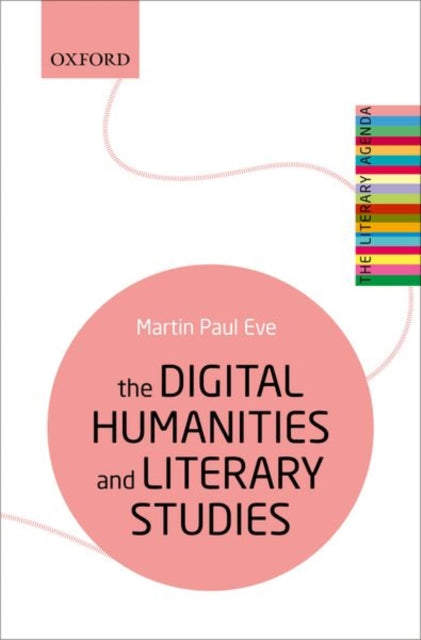Martin PaulEve
The Digital Humanities and Literary Studies
The Digital Humanities and Literary Studies
YOU SAVE £0.84
- Condition: Brand new
- UK Delivery times: Usually arrives within 2 - 3 working days
- UK Shipping: Fee starts at £2.39. Subject to product weight & dimension
Bulk ordering. Want 15 or more copies? Get a personalised quote and bigger discounts. Learn more about bulk orders.
Couldn't load pickup availability
- More about The Digital Humanities and Literary Studies
The Literary Agenda is a series of short polemical monographs about the importance of literature and reading in the wider world and the state of literary education inside schools and universities. It is being dismissed or unrecognised as a way of thinking or an arena for thought, but this is the right time for renewal. This book provides an insight into the ways in which digital approaches can be used to study literature and the ways in which humanistic study can be used to explore digital literature. It combines original research with third-party case studies and examples and will appeal to students and researchers across all levels.
Format: Paperback / softback
Length: 208 pages
Publication date: 10 February 2022
Publisher: Oxford University Press
The Literary Agenda is a groundbreaking series of concise and thought-provoking monographs that delve into the profound significance of literature and the importance of reading in the broader
The Literary Agenda is a groundbreaking series of concise and thought-provoking monographs that delve into the profound significance of literature and the importance of reading in the wider world. These monographs address the state of literary education within schools and universities, emphasizing the need for a renewed focus on the value and significance of literary reading.
The category of literature has always been a subject of contentious debate, with its definition and significance being challenged from various perspectives. However, what is increasingly clear is the dismissal or lack of recognition of literature as a way of thinking and an arena for intellectual exploration. This skepticism is manifested both internally, through rival claims made by cultural history, contextualized explanation, and media studies, and externally, by the pressures of economic exigency and the severe social attitudes that can result from it. Technological change, which may render traditional forms of serious human communication outdated, further exacerbates this situation.
In light of these challenges, this is an opportune moment for a renewal of efforts to understand the meaning and value of literary reading. The digital humanities, a rapidly evolving field, presents a promising avenue for exploring the intersections between literature and digital technologies. This book aims to provide an insightful introduction to the ways in which digital approaches can be employed to study literature, as well as how humanistic study can be used to explore digital literature.
The book examines its subject across multiple axes, including authorship, space, visualization, maps and place, distance and history, and ethical approaches to the digital humanities. By exploring these axes, the book introduces newcomers to the topic while also offering valuable insights for seasoned digital humanities professionals.
Combining original research with case studies from third parties and examples, the book provides a comprehensive overview of the field. It offers a rich tapestry of perspectives and methodologies, fostering a deeper understanding of the potential of digital technologies to enhance our understanding and appreciation of literature.
In conclusion, The Literary Agenda is a vital contribution to the ongoing dialogue about the future of literature and the role of digital technologies in shaping it. By providing a comprehensive and interdisciplinary exploration of the subject, the book offers a roadmap
In conclusion, The Literary Agenda is a vital contribution to the ongoing dialogue about the future of literature and the role of digital technologies in shaping it. By providing a comprehensive and interdisciplinary exploration of the subject, the book offers a rich tapestry of perspectives and methodologies, fostering a deeper understanding of the potential of digital technologies to enhance our understanding and appreciation of literature.
The growth of the use of digital methods for the study of literature is inevitable, and this book provides a valuable guide for those seeking to navigate this complex terrain. By exploring the intersections between literature and digital technologies, the book offers a roadmap for scholars, educators, and enthusiasts alike, as we navigate the rapidly evolving landscape of literary studies in the digital age.
Weight: 226g
Dimension: 129 x 195 x 18 (mm)
ISBN-13: 9780198850489
This item can be found in:
UK and International shipping information
UK and International shipping information
UK Delivery and returns information:
- Delivery within 2 - 3 days when ordering in the UK.
- Shipping fee for UK customers from £2.39. Fully tracked shipping service available.
- Returns policy: Return within 30 days of receipt for full refund.
International deliveries:
Shulph Ink now ships to Australia, Belgium, Canada, France, Germany, Ireland, Italy, India, Luxembourg Saudi Arabia, Singapore, Spain, Netherlands, New Zealand, United Arab Emirates, United States of America.
- Delivery times: within 5 - 10 days for international orders.
- Shipping fee: charges vary for overseas orders. Only tracked services are available for most international orders. Some countries have untracked shipping options.
- Customs charges: If ordering to addresses outside the United Kingdom, you may or may not incur additional customs and duties fees during local delivery.


